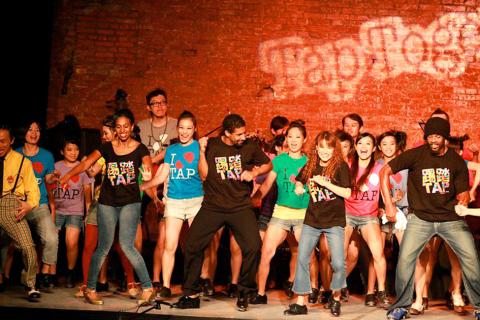Tap Together, the 7th annual Taipei Tap Festival, finishes up with two shows tomorrow and a free Tappers’ Party in the form of an improvisational jam session tonight. The performances cap a busy week of 32 classes and lectures that began on Friday last week at the Huashan 1914 Creative Park (華山1914), with three tap professionals from the US joining Taipei’s own Dance Works team in teaching everyone from tots to adults, and beginners to experienced tappers, how to polish their act. From its humble beginnings as a show outside the Shilin MRT Station (士林捷運站) in 2005, Tap Together has become one of the most important tap festivals in Asia, drawing fans and performers from Japan, Hong Kong, the US and Europe as well as Taiwan. Tomorrow’s shows will feature local tap stars along with Derick Grand, Jason Smith, Chloe Arnold, Yukiko “Smilie” Misume and several others.
■ Tap Together Shows: Taipei City Government Family Theater (台北市政府親子劇場), 2F, Taipei City Hall, 1 Shifu Rd, Taipei City (台北市市府路1號2樓)
■ Tomorrow at 2:30pm and 7:30pm. Tickets are NT$600 and 900, available at the NTCH box office or online at www.artsticket.com.tw. The matinee is sold out and about 60 tickets were left as of press time for the evening show

Photo Courtesy of Dance Works
■ Tonight’s Tapper’s Party will be held at the Outdoor Theater at Huashan 1914 Creative Park (華山1914), 1, Bade Rd Sec 1, Taipei City (台北市八德路一段1號) from 7:30pm to 9:30pm. Admission is free
■ More information on the festival is available online at taipeitap.com.tw/event/ or facebook.com/pages/Taipei-Tap-Fest-台北踢踏節/176495562398739

Oct. 27 to Nov. 2 Over a breakfast of soymilk and fried dough costing less than NT$400, seven officials and engineers agreed on a NT$400 million plan — unaware that it would mark the beginning of Taiwan’s semiconductor empire. It was a cold February morning in 1974. Gathered at the unassuming shop were Economics minister Sun Yun-hsuan (孫運璿), director-general of Transportation and Communications Kao Yu-shu (高玉樹), Industrial Technology Research Institute (ITRI) president Wang Chao-chen (王兆振), Telecommunications Laboratories director Kang Pao-huang (康寶煌), Executive Yuan secretary-general Fei Hua (費驊), director-general of Telecommunications Fang Hsien-chi (方賢齊) and Radio Corporation of America (RCA) Laboratories director Pan
The consensus on the Chinese Nationalist Party (KMT) chair race is that Cheng Li-wun (鄭麗文) ran a populist, ideological back-to-basics campaign and soundly defeated former Taipei mayor Hau Lung-bin (郝龍斌), the candidate backed by the big institutional players. Cheng tapped into a wave of popular enthusiasm within the KMT, while the institutional players’ get-out-the-vote abilities fell flat, suggesting their power has weakened significantly. Yet, a closer look at the race paints a more complicated picture, raising questions about some analysts’ conclusions, including my own. TURNOUT Here is a surprising statistic: Turnout was 130,678, or 39.46 percent of the 331,145 eligible party

The classic warmth of a good old-fashioned izakaya beckons you in, all cozy nooks and dark wood finishes, as tables order a third round and waiters sling tapas-sized bites and assorted — sometimes unidentifiable — skewered meats. But there’s a romantic hush about this Ximending (西門町) hotspot, with cocktails savored, plating elegant and never rushed and daters and diners lit by candlelight and chandelier. Each chair is mismatched and the assorted tables appear to be the fanciest picks from a nearby flea market. A naked sewing mannequin stands in a dimly lit corner, adorned with antique mirrors and draped foliage

President William Lai (賴清德) has championed Taiwan as an “AI Island” — an artificial intelligence (AI) hub powering the global tech economy. But without major shifts in talent, funding and strategic direction, this vision risks becoming a static fortress: indispensable, yet immobile and vulnerable. It’s time to reframe Taiwan’s ambition. Time to move from a resource-rich AI island to an AI Armada. Why change metaphors? Because choosing the right metaphor shapes both understanding and strategy. The “AI Island” frames our national ambition as a static fortress that, while valuable, is still vulnerable and reactive. Shifting our metaphor to an “AI Armada”